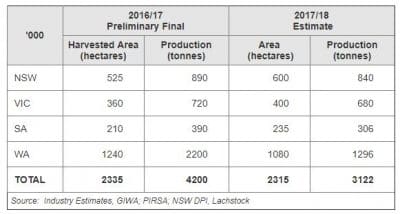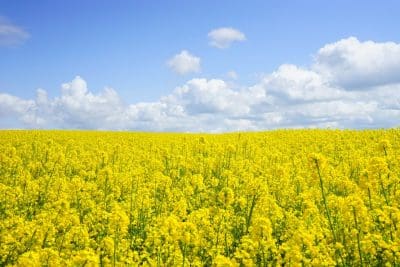RECENT rains have bolstered canola grower confidence after one of the driest June months on record in many canola growing regions, according to the latest Australian Oilseeds Federation (AOF) report.
 The reported area sown in Western Australia and South Australia has been reduced from earlier estimates as dry-sown canola in some areas failed to germinate and has been re-sown to cereals or left fallow.
The reported area sown in Western Australia and South Australia has been reduced from earlier estimates as dry-sown canola in some areas failed to germinate and has been re-sown to cereals or left fallow.
AOF said it was, however, reluctant to lift forecast yields at this time, as the rain that had fallen had been patchy and light, being generally less that 15 millimetres in most areas.
Large high pressure systems in the Great Australian Bight have been blocking the traditional rain-bringing cold fronts, which has led to a very dry start for many areas, particularly the west coast facing regions of WA and SA’s Eyre Peninsula.
While the Bureau of Meteorology has reduced the likelihood of an El Nino event, with pre-cursor requirements dissipating, drier than average conditions are still forecast for much of growing season.
Indeed, despite the rain fall of the past week, no significant rain events are forecast for the next few weeks.
 The estimated 2.3 million ‘viable’ hectares of canola sown is in line with the five-year average, with commercial planting seed shortages seemingly having little impact on growers’ planting intentions.
The estimated 2.3 million ‘viable’ hectares of canola sown is in line with the five-year average, with commercial planting seed shortages seemingly having little impact on growers’ planting intentions.
However, the higher than average use of farmer saved seed (at the expense of hybrids) has caused the AOF to temper yield estimates from the start, before accounting for any moisture related stress that may eventuate.
Weighted average yield is currently 1.33 tonnes/hectare versus five-year average (excluding last year) of 1.53t/ha.
State-by-state conditions for canola:
New South Wales
NSW has fared better than SA and WA with the drier conditions. Early sown crops were able to establish well on the April rain and able to access the deeper stored moisture remaining from a very wet spring last year. Later sown canola is withstanding the drier conditions, but needs replenishing rain to ensure optimal biomass production and ground cover. Sub soil moisture levels are now reported as being below average in many canola growing areas. The drier conditions have reduced the risk of early signs of sclerotinia and blackleg, although slugs have been reported as being a significant issue in many areas. At this stage, all sown areas have been held constant for this Crop Report.
Victoria
Conditions are very good, with the largest planted area in many years on the back of very moist soils at the time of planting. Soil moisture levels remain good in many areas, including the Wimmera and Mallee, but will be in need of replenishment soon. We have applied a greater than average yield for Victoria at this stage, given the very positive growing conditions being experienced.
South Australia
SA has been strongly impacted by the lack of rain, in particular, the Eyre and Yorke Peninsula regions. Area sown has been reduced, particularly on the Eyre Peninsula, in areas where canola was sown dry, and had not germinated. These areas have generally been re-sown to cereals.
The AOF have at this stage applied an average yield to the remaining areas, however this will need to be reduced if rain is not forthcoming soon.
Western Australia
WA had extensive canola planting during April, much of it sown dry on the expectation of a typical early May break. However, falls of only around 10mm were not uncommon in the areas where it did rain, with zero rain recorded in many areas. Geraldton Zone has been the most affected, with canola germination (where it has germinated) being very patchy, and likely to be turned to winter fallow or cereals. Consequently, the AOF has reduced the area for WA, and applyied a yield of slightly under 1.2t/ha, well short of recent yields and more in line with those experienced last decade.
Source : AOF



HAVE YOUR SAY